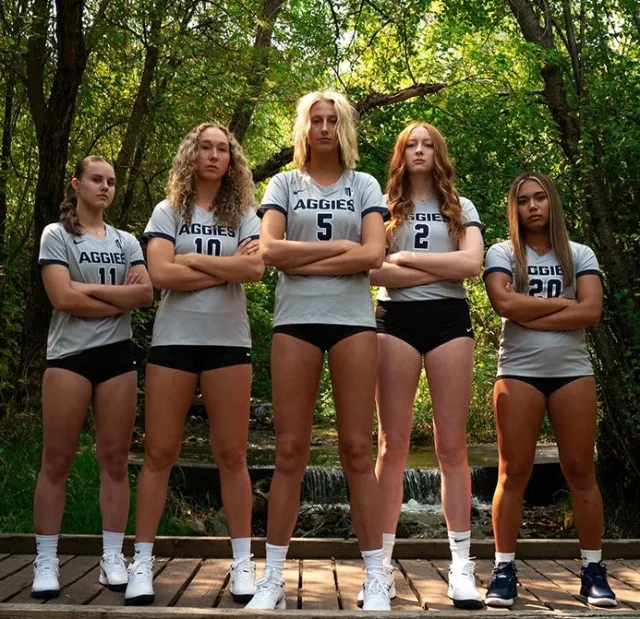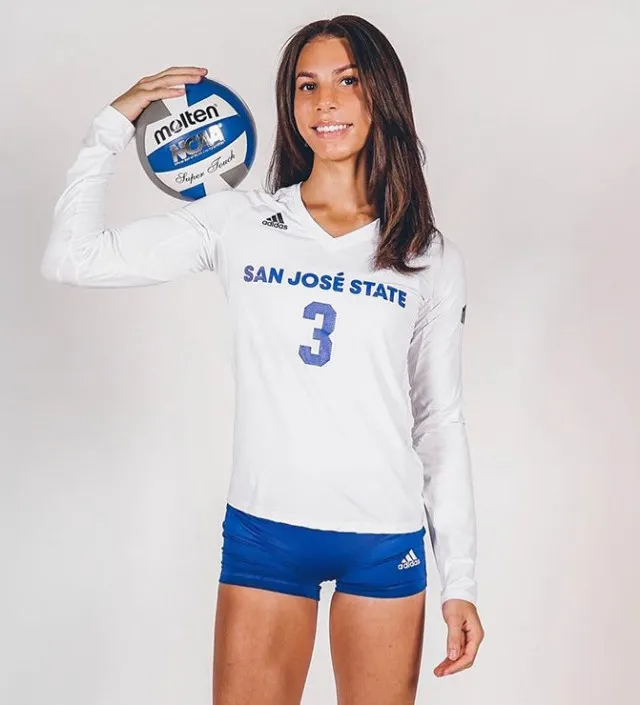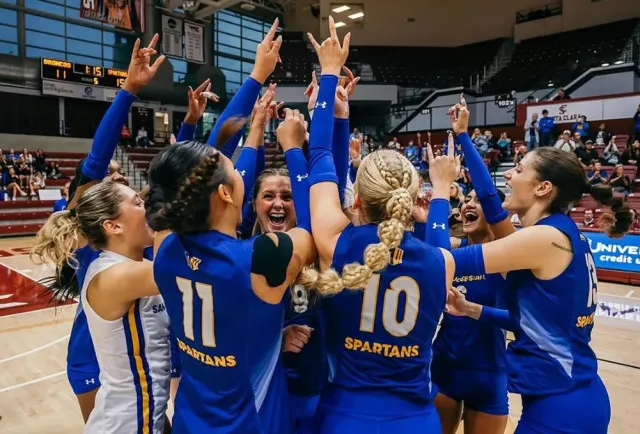The world of sports has always been a stage for debates, but few topics have sparked as much controversy as the participation of transgender athletes in women’s competitions. Recently, Utah State University’s women’s volleyball team chose to forfeit a match against San Jose State University due to the presence of Blaire Fleming, a transgender player. This decision has reignited the ongoing conversation about fairness, inclusion, and the evolving dynamics of women’s sports.
The Forfeited Match: Utah State vs. San Jose State

Utah State University was scheduled to play against San Jose State University on October 23, 2024. However, when Utah State’s team discovered that San Jose State’s roster included Blaire Fleming, a transgender player, they made the decision to forfeit the match. The move was not just a simple withdrawal but a public statement regarding their stance on fairness in women’s sports.
The university later released a formal statement, expressing its position: “Utah State University will not participate in its scheduled October 23, 2024, volleyball match at San Jose State University. The University remains committed to fair competition in women’s athletics and will abide by the Mountain West Conference policy regarding match results.”
Who Is Blaire Fleming? A Rising Volleyball Star
Blaire Fleming is no stranger to the volleyball court. A senior player at San Jose State, Fleming has established herself as one of the top competitors on her team. This season alone, she has contributed to her team’s undefeated record, making her one of their key players.
Originally from Coastal Carolina University, Fleming transferred to San Jose State after facing barriers to participation in women’s sports at her former school. Her strong performance on the court has been characterized by impressive statistics, including 118.5 points and 103 kills this season. Standing at 6 feet 1 inch, Fleming’s powerful spikes have raised eyebrows, with some of her hits reportedly reaching speeds of up to 80 mph—much faster than the average for women’s volleyball.
The Growing Controversy: A Lawsuit and Player Concerns
Fleming’s participation in women’s volleyball has not come without pushback. A lawsuit has been filed, alleging that her involvement violates laws restricting transgender athletes from competing in women’s sports. The controversy has put Fleming and her teammates under intense scrutiny, not only from opponents but also from within her own team.

Utah State abandons match after discovering transgender player on opponent team. Image Credits: blaire.fleming
Brooke Slusser, a teammate of Fleming’s, has voiced concerns about the physical dynamics of competing with someone who possesses distinct physical advantages due to their biological sex. In a statement supporting the lawsuit, Slusser noted: “The girls were doing everything they could to dodge Fleming’s spikes but still could not fully protect themselves.” She described Fleming’s spikes as significantly faster than any she had seen in women’s volleyball, raising questions about player safety during matches.
Support from Governor Spencer Cox and Other Universities
The decision by Utah State to forfeit the match has received support from Utah Governor Spencer Cox. In a public statement, Governor Cox emphasized the need for fair competition and the importance of protecting female athletes. He criticized the NCAA for what he sees as a failure to adequately safeguard women’s sports. “Our female athletes are left grappling with this difficult issue because the NCAA has failed in its responsibility to protect female athletes and women’s sports. It’s time for the NCAA to take this seriously and protect our female student-athletes,” Cox asserted.
The move by Utah State is not unprecedented. Other universities, including Southern Utah, Boise State, and the University of Wyoming, have also chosen to forfeit matches against San Jose State due to the inclusion of transgender athletes on their rosters. These decisions reflect a broader resistance within the Mountain West Conference, where universities are navigating the complex intersection of fairness, safety, and inclusion.
San Jose State’s Response: Standing by Their Athlete

San Jose State University responded to the forfeiture with a statement of disappointment. The university underscored its commitment to inclusivity and compliance with NCAA and Mountain West rules. In their statement, they expressed concern for their athletes, who were denied the chance to compete: “It is disappointing that our SJSU student-athletes, who are in full compliance with NCAA and Mountain West rules and regulations, are being denied opportunities to compete. We are committed to supporting our student-athletes through these challenges and in their ability to compete in an inclusive, fair, safe, and respectful environment.”
The administration at San Jose State maintains that Fleming’s participation is within the regulatory guidelines set by the NCAA. They emphasize the importance of providing a respectful and equitable environment for all athletes, regardless of gender identity.
The Broader Debate: Fairness vs. Inclusion in Women’s Sports
The incident involving Fleming is not an isolated case; it is part of a larger, ongoing debate about the inclusion of transgender athletes in women’s sports. On one side, advocates argue that transgender athletes deserve the same opportunities to compete as their cisgender peers, emphasizing the need for inclusivity and acceptance. On the other side, opponents raise concerns about fairness, citing potential physical advantages that transgender women might have over cisgender women in certain sports.
The NCAA’s current policies allow transgender athletes to compete in women’s sports under specific conditions, such as undergoing hormone therapy. However, these policies have not eliminated the controversy, as questions about safety, competitive fairness, and the long-term impact on women’s sports persist.

Brooke Slusser said teammates felt uncomfortable with Fleming due to safety concerns. Image credits: brookeslusser04
The Impact on Athletes and Future Implications
The decision by Utah State and other universities to forfeit matches rather than compete against teams with transgender athletes has far-reaching implications. It puts pressure on athletic organizations like the NCAA to revisit their policies and address the concerns of athletes, coaches, and universities. This situation also affects the players themselves, who are caught in the middle of a complex and emotionally charged debate.
For transgender athletes like Fleming, the controversy can be deeply personal. They face not only the physical challenges of their sport but also the emotional toll of being at the center of a nationwide debate. For cisgender athletes, there are concerns about fairness and safety, as well as questions about how best to support all athletes in an inclusive and respectful manner.
Conclusion: Navigating an Uncharted Path in Women’s Sports
The decision by Utah State to forfeit its volleyball match against San Jose State has once again brought the issue of transgender athletes in women’s sports to the forefront. As more universities take similar stances, it is clear that the conversation is far from over. Balancing fairness with inclusion remains a challenge, one that athletic organizations, athletes, and policymakers must navigate carefully.
In the end, the situation is not just about one player or one match—it’s about how we define fairness, equity, and inclusivity in sports. The path forward will require thoughtful dialogue, policy adjustments, and a commitment to ensuring that all athletes can compete in an environment that is both safe and fair. As the debate continues, one thing is certain: the landscape of women’s sports is evolving, and it will take a collective effort to shape it responsibly.


